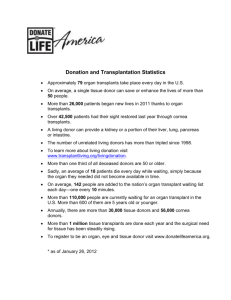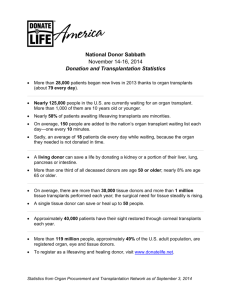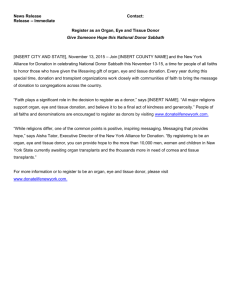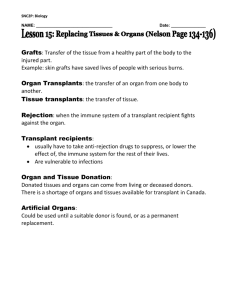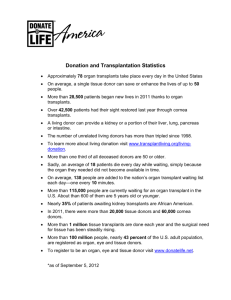Coalition on Donation
advertisement
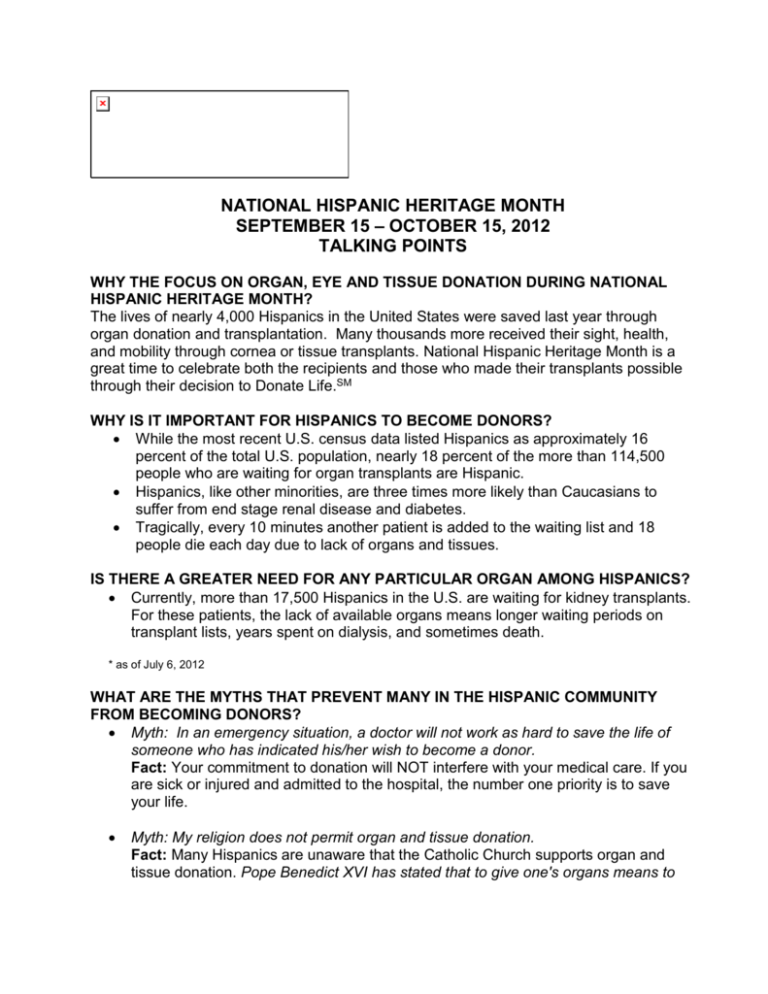
NATIONAL HISPANIC HERITAGE MONTH SEPTEMBER 15 – OCTOBER 15, 2012 TALKING POINTS WHY THE FOCUS ON ORGAN, EYE AND TISSUE DONATION DURING NATIONAL HISPANIC HERITAGE MONTH? The lives of nearly 4,000 Hispanics in the United States were saved last year through organ donation and transplantation. Many thousands more received their sight, health, and mobility through cornea or tissue transplants. National Hispanic Heritage Month is a great time to celebrate both the recipients and those who made their transplants possible through their decision to Donate Life.SM WHY IS IT IMPORTANT FOR HISPANICS TO BECOME DONORS? While the most recent U.S. census data listed Hispanics as approximately 16 percent of the total U.S. population, nearly 18 percent of the more than 114,500 people who are waiting for organ transplants are Hispanic. Hispanics, like other minorities, are three times more likely than Caucasians to suffer from end stage renal disease and diabetes. Tragically, every 10 minutes another patient is added to the waiting list and 18 people die each day due to lack of organs and tissues. IS THERE A GREATER NEED FOR ANY PARTICULAR ORGAN AMONG HISPANICS? Currently, more than 17,500 Hispanics in the U.S. are waiting for kidney transplants. For these patients, the lack of available organs means longer waiting periods on transplant lists, years spent on dialysis, and sometimes death. * as of July 6, 2012 WHAT ARE THE MYTHS THAT PREVENT MANY IN THE HISPANIC COMMUNITY FROM BECOMING DONORS? Myth: In an emergency situation, a doctor will not work as hard to save the life of someone who has indicated his/her wish to become a donor. Fact: Your commitment to donation will NOT interfere with your medical care. If you are sick or injured and admitted to the hospital, the number one priority is to save your life. Myth: My religion does not permit organ and tissue donation. Fact: Many Hispanics are unaware that the Catholic Church supports organ and tissue donation. Pope Benedict XVI has stated that to give one's organs means to give expression to a true, deep act of love for one's neighbor. In fact there are no religions that oppose donation. Myth: Celebrities and the rich get preferential treatment on the organ transplant waiting list. Fact: One’s celebrity or financial status does not play a part in the decision of who receives organs on the national transplant waiting list. Organs are allocated based on a variety of medical and logistical factors including blood type, size of organ needed, waiting time, distance between donor and recipient, degree of immune system match and medical urgency, among others. When a celebrity needs or receives a transplant, it gets more attention from the media, so it may seem like they are getting special consideration. However, they have been placed on a blinded waiting list like everyone else. Likewise, the rich cannot “buy” an organ for transplant. The buying and selling of organs is illegal in the United States. Myth: There is a financial cost to become a donor. Fact: There is no cost to the donor or the donor’s estate. The family of the donor is only responsible for the funeral costs and any medical costs incurred before death. Myth: Organ, eye and tissue donors cannot have normal funerals. Fact: Donation should not delay or change funeral arrangements. A donor can have an open casket funeral. HOW CAN I BECOME AN ORGAN, EYE AND TISSUE DONOR? Register as an organ, eye and tissue donor with your state donor registry. To find out how, visit www.donatelife.net. For information in Spanish, visit www.donevida.org. Once you have decided and registered your decision to become a donor, it is important to share your decision with your family so that they know and understand your wishes. WHAT IS DONATE LIFE AMERICA? Founded in 1992, Donate Life America is a not-for-profit alliance of national organizations and state teams across the United States, driving individuals, organizations and communities to increase the number of designated organ, eye and tissue donors who save and heal lives with a vision of a nation that embraces organ, eye and tissue donation as a fundamental human responsibility.
